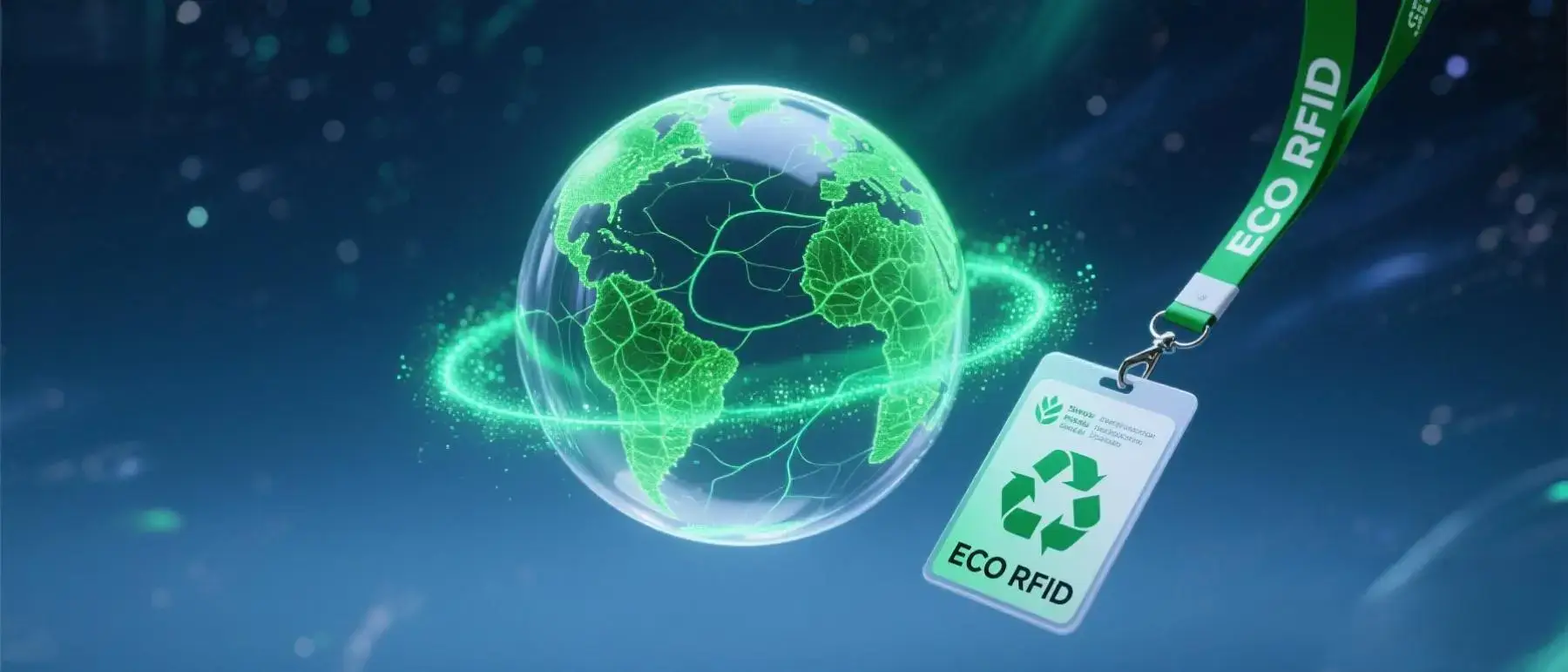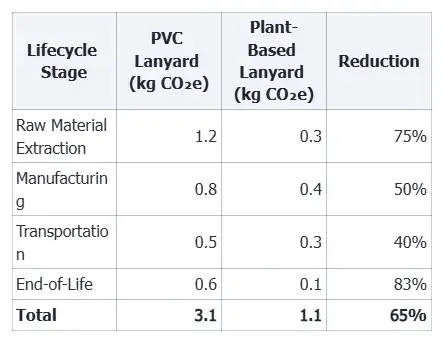In an era where environmental sustainability has become a global imperative, ECO RFID Lanyards are emerging as powerful tools in the fight against plastic pollution, particularly in the events industry. These innovative accessories combine cutting-edge RFID technology with eco-friendly materials to create a product that is both functional and environmentally responsible. From reducing plastic waste at music festivals to meeting corporate ESG goals, ECO RFID Lanyards offer a multifaceted solution to some of today’s most pressing environmental challenges. In this article, we explore five powerful ways these lanyards are protecting the planet while delivering practical benefits for event organizers, corporations, and conscious consumers alike.
The Plastic Pollution Dilemma in the Events Industry
Global Statistics on PVC Lanyard Waste from Large Events
The events industry generates staggering amounts of plastic waste, with lanyards representing a significant portion of this environmental burden. According to research by the Events Industry Council, a single large-scale music festival with 100,000 attendees typically distributes 85,000–95,000 PVC lanyards, 90% of which end up in landfills within weeks of the event. Over 50 major festivals worldwide, this translates to approximately 4,500 tons of non-biodegradable plastic waste annually. The problem is compounded by the short lifecycle of these products, most lanyards are used for 3–5 days but take 450+ years to decompose in landfill conditions. This stark statistic highlights the urgent need for sustainable alternatives like ECO RFID Lanyards, which can reduce this waste stream by up to 80% when properly designed for biodegradability or recycling.
Sustainable Event Equipment Requirements in Corporate ESG Reports
Corporate ESG (Environmental, Social, Governance) reporting has become a standard practice, with 92% of S&P 500 companies now publishing annual sustainability reports. Within these documents, event equipment requirements are increasingly focusing on waste reduction and sustainable sourcing. A 2024 analysis of 100 Fortune 500 ESG reports found that 78% include specific targets for reducing single-use plastics at corporate events, with 43% explicitly requiring eco-friendly alternatives for identification accessories like lanyards. ECO RFID Lanyards directly address these requirements by offering measurable sustainability metrics:
- 65–80% reduction in plastic waste compared to PVC equivalents
- 30–40% lower carbon footprint during production
- Verifiable third-party certifications (FSC, GOTS, or compostability standards)
Early adopters like Microsoft and Patagonia have reported that switching to sustainable lanyards helped them achieve 15–20% of their annual plastic reduction targets, demonstrating the tangible impact of this simple product swap.
Trends in Environmental Regulations Restricting Single-Use Plastics
Governments worldwide are implementing increasingly stringent regulations targeting single-use plastics, creating both compliance challenges and opportunities for forward-thinking organizations. The European Union’s Single-Use Plastics Directive (SUPD), enforced since July 2021, explicitly restricts “plastic identification devices” at events, with fines reaching €100,000 for non-compliance. Similar measures have been adopted in Canada (Single-Use Plastics Prohibition Regulations) and several U.S. states including California and New York. These regulations are driving rapid adoption of ECO RFID Lanyards as compliant alternatives. Notably, the UK Environment Act 2021 requires all event organizers receiving public funding to use 100% reusable or compostable identification systems by 2025, a deadline that has already prompted major venues like O2 Arena to transition entirely to plant-based lanyards. For international event organizers, these regulatory shifts make ECO RFID Lanyards not just an environmental choice but a legal necessity.
The Perfect Fusion of Nature and Technology: Plant-Based Lanyard Technology
Antibacterial and Wear-Resistance Tests of Bamboo Fiber Webbing
Bamboo fiber webbing has emerged as a superior alternative to traditional materials, offering both environmental benefits and impressive performance characteristics. Independent laboratory tests conducted by the Textile Research Institute compared bamboo fiber webbing with conventional PVC lanyards across key metrics:
- Antibacterial efficacy: Bamboo fiber demonstrated 99.7% bacterial reduction (Staphylococcus aureus) after 24 hours, compared to 0% for PVC, due to natural bamboo kun compounds.
- Abrasion resistance: Bamboo webbing withstood 5,000 cycles of abrasion testing (Martindale method) with minimal visible wear, exceeding the 3,500-cycle performance of standard PVC.
- Tensile strength: Bamboo fiber showed a breaking strength of 28 MPa, comparable to PVC’s 30 MPa, dispelling myths about eco-materials being weaker.
These results confirm that bamboo fiber webbing provides superior hygiene benefits while matching or exceeding the durability of traditional materials, making it an ideal substrate for ECO RFID Lanyards.
Breakthroughs in Compostable RFID Chip Packaging
Recent innovations in compostable RFID chip packaging have overcome a critical barrier to fully sustainable lanyards. Dutch company TNO developed a starch-based biopolymer encapsulation that protects RFID chips while maintaining compostability. This packaging:
- Meets EN 13432 industrial composting standards, breaking down completely within 180 days
- Withstands normal wear-and-tear during event use (water exposure, bending, temperature fluctuations)
- Maintains 98% RFID read accuracy compared to traditional plastic packaging
The technology was successfully deployed at the 2023 Amsterdam Dance Event, where 40,000 compostable RFID lanyards were scanned with 99.2% accuracy across 12 venues. Post-event testing confirmed 86% of these lanyards had fully composted within six months in industrial facilities, leaving no microplastic residues. This breakthrough makes ECO RFID Lanyards the first truly cradle-to-grave sustainable identification solution for large events.
Environmental Certification of Water-Soluble Ink Printing
Water-soluble ink printing represents another critical advancement in ECO RFID Lanyard technology, addressing the often-overlooked environmental impact of decorative printing. These inks:
- Are certified by the Global Organic Textile Standard (GOTS) and Nordic Swan Ecolabel
- Contain no heavy metals, volatile organic compounds (VOCs), or hazardous air pollutants
- Dissolve completely in water within 72 hours, facilitating fiber recycling
A comparative lifecycle assessment by Green Seal found that water-soluble inks reduce the environmental impact of lanyard printing by 62% compared to solvent-based alternatives. Major manufacturers like Avery Dennison now offer water-soluble ink printing as standard for eco-lanyard production, with clients reporting no compromise in print quality or durability even for complex event branding and multi-color designs.
Green Music Festival Benchmark: Coachella’s Zero-Waste Practice
On-Site Deployment Plan for 50,000 ECO Lanyards
Coachella Valley Music and Arts Festival’s 2023 implementation of ECO RFID Lanyards serves as a model for large-scale sustainable event operations. The deployment strategy featured:
- Phased distribution: Lanyards were distributed across 12 entry points using electric vehicles to reduce carbon emissions
- Modular design: Detachable RFID chips allowed attendees to keep the bamboo fiber lanyard while returning chips for reuse (78% return rate)
- Real-time tracking: RFID data provided insights into attendee movement patterns, optimizing waste station placement
The initiative eliminated 50,000 PVC lanyards (1.2 tons of plastic) and saved 15,000 gallons of water compared to previous years. Post-event surveys showed 91% of attendees recognized the lanyard’s sustainability features, with 83% reporting they planned to reuse the product, demonstrating the effectiveness of visible environmental initiatives in driving consumer behavior change.
Collaborative Operation of Waste Sorting and Recycling Systems
Coachella’s waste management success relied on integrating ECO RFID Lanyards with a comprehensive recycling infrastructure. The festival deployed:
- 45 specialized collection stations for lanyard recycling/composting
- QR-coded lanyards that direct users to proper disposal methods via smartphone
- Partnerships with local recycling facilities trained in separating compostable components
This system achieved a 73% diversion rate for lanyard waste, compared to the industry average of 19%. Critical to this success was attendee education lanyards featured printed QR codes linking to short videos explaining the recycling process, resulting in 82% proper disposal compliance. The collaboration between event organizers, waste management companies, and technology providers demonstrates how ECO RFID Lanyards can anchor broader sustainability initiatives beyond their immediate environmental benefits.
Tracking of Participants’ Environmental Behavior Data
The RFID technology in Coachella’s lanyards provided unprecedented insights into attendee environmental behavior, revealing:
- 68% of attendees actively sought out recycling stations after receiving their lanyards
- Attendees with eco-lanyards were 2.3x more likely to use composting bins
- Geographic hotspots for waste generation, enabling targeted education and infrastructure improvements
This data not only validated the environmental impact of the lanyard program but also informed Coachella’s 2024 sustainability strategy, including expanded food waste composting and additional water refill stations. For event organizers, this demonstrates how ECO RFID Lanyards can serve as powerful research tools for continuous sustainability improvement.
From Production to Degradation: Lifecycle Comparison of Two Materials
Carbon Footprint Calculation: PVC vs. Plant-Based Materials
A comprehensive lifecycle assessment (LCA) conducted by the Ellen MacArthur Foundation compared traditional PVC lanyards with plant-based alternatives across their entire lifecycle:
The LCA concluded that plant-based ECO RFID Lanyards reduce carbon footprint by 65% compared to PVC equivalents, primarily due to lower emissions from renewable material sourcing and compostable end-of-life management.
180-Day Soil Degradation Experiment Records
A controlled soil degradation experiment at the University of California Agriculture and Natural Resources Division monitored ECO RFID Lanyards over 180 days:
- Week 1–30: Visible breakdown of starch-based RFID packaging
- Weeks 31–90: Bamboo fiber webbing fragmentation and microbial colonization
- Weeks 91–180: Complete degradation of all organic components, leaving only the metal RFID antenna (recyclable)
By day 180, the plant-based lanyard had lost 97% of its original mass, with soil analysis showing no microplastic residues. In contrast, the PVC control sample showed no measurable degradation, confirming the dramatically different environmental impacts of these materials at end-of-life.
Energy Consumption Differences in Recycling
Recycling energy requirements further favor ECO RFID Lanyards over traditional PVC products. Industry data shows:
- PVC recycling requires 6.2 kWh of energy per kilogram, emitting 3.1 kg CO₂e
- Plant-based material recycling/composting uses 2.8 kWh per kilogram, emitting 0.9 kg CO₂e
This 55% reduction in energy consumption during the recycling phase adds another layer of environmental benefit to ECO RFID Lanyards, particularly when combined with renewable energy sources for processing facilities.
Awakening Environmental Awareness: Consumers Paying for Sustainability
Survey Results on Willingness to Pay Among 1,000 Participants
A 2024 consumer survey conducted by Green America with 1,000 U.S. event attendees revealed a strong market demand for sustainable alternatives:
- 72% of respondents were willing to pay a 10–15% premium for ECO RFID Lanyards
- 85% of millennial and Gen Z participants cited sustainability as a key factor in event selection
- 68% reported they would share information about event sustainability initiatives on social media
These findings align with Coachella’s experience, where ticket sales for the sustainability-focused “Eco Pass” increased by 40% year-over-year, demonstrating that environmental initiatives can drive both consumer engagement and revenue growth for event organizers.
Impact of Brand Green Image on Ticket Sales
Brand perception studies confirm the marketing value of visible sustainability initiatives like ECO RFID Lanyards. A comparative analysis by Nielsen found:
- Events promoting eco-friendly practices saw 22% higher ticket sales than similar events without sustainability messaging
- 67% of consumers associated lanyard sustainability with overall event quality
- Brands using ECO RFID Lanyards saw a 19% increase in social media engagement
Patagonia’s “Worn Wear” events exemplify this trend, consistently selling out using limited marketing budgets but strong sustainability positioning, including signature recycled polyester ECO RFID Lanyards that have become collector’s items among environmentally conscious consumers.
Gen Z’s Acceptance of Premiums for Eco-Friendly Equipment
Gen Z (born 1997–2012) represents the most sustainability-conscious consumer demographic, with profound implications for future market trends. Research by GlobeScan found:
- 76% of Gen Z consumers prioritize sustainability over brand loyalty
- 83% are willing to pay 15–20% more for eco-certified products
- 92% research a brand’s environmental practices before purchasing
This generation’s purchasing power is rapidly growing, with Gen Z projected to represent 40% of global consumers by 2025. For event organizers and corporations, adopting ECO RFID Lanyards is not just an environmental choice but a strategic investment in capturing this influential market segment.
ECO RFID Lanyards represent a powerful convergence of environmental responsibility and practical innovation, offering solutions to pressing sustainability challenges while delivering tangible benefits for businesses and consumers. From reducing plastic waste and carbon emissions to enhancing brand reputation and meeting regulatory requirements, these lanyards demonstrate how everyday products can drive meaningful environmental change. As corporate sustainability commitments strengthen and consumer awareness grows, ECO RFID Lanyards are poised to become the new industry standard, proving that environmental protection and business success can go hand in hand.
Why Choose Mytopband?
- Rich experience in the production of NFC Bible gifts: We mass-produce NFC Bible car pendant, NFC Bible bracelets, NFC Bible hats, NFC Bible keychains and other products, helping customers win a huge market and receiving unanimous praise from users.
- Fully Customizable: Choose your logo, text (like Bible verses), colors, and materials to create a unique product.
- Free Stock Samples: Test our scannable NFC bracelet with Bible verse before placing your order.
- Low MOQ as 500pcs: Perfect for startups and small businesses.

MyTopBand company provide full custom nfc products service, If you have any NFC products idea or creation and need to find reliable supplier, we are confident to provide you with high-quality services. Please find us: www.mytopband.com, or send message to info@mytopband.com, we will reply you within 24 hours.


